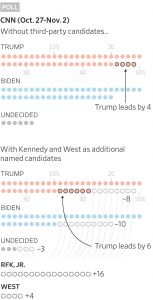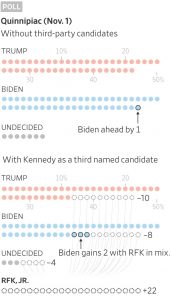President Biden and Donald Trump, the likely contenders for the White House next year, are about evenly divided in polling. In a head-to-head race, many polls find an outright tie, with few voters undecided.
Most voters, however, will have several choices beyond Trump and Biden—a fact that isn’t reflected in many public-opinion polls. When polls do offer a larger slate of options, Biden often loses the most support to those additional candidates or to “undecided” status, giving Trump an edge.
For Democrats, that prospect took on new urgency Thursday as Sen. Joe Manchin, a Democrat from West Virginia, renewed speculation that he would try to run for president with the group No Labels, which says it wants to fund a bipartisan ticket. Manchin said he would abandon re-election plans for the Senate and instead explore the national appetite for “creating a movement to mobilize the middle and bring Americans together.”
Biden loses slightly more ground than Trump in several other polls in which voters are presented both a two-candidate ballot and then a ballot with four or more options.

That is why many Democrats fear the effect that third parties and independent candidates could have on the president.
Liberal intellectual Cornel West and Robert F. Kennedy Jr., known for his antivaccine advocacy, have said they would run as independents. To appear on any state’s ballot, they will need to meet requirements the state sets, which usually entails a signature-gathering effort.
Polling suggests that one candidate, Kennedy, stands out as a particular wild card because of how much support he draws. He might pull more votes away from Trump than Biden, if he gains access to ballots.
While Kennedy comes from America’s most famous Democratic family, his advocacy against vaccines and skepticism of government regulators and public-health officials have made him more popular among Republicans than Democrats.
Several polls find that Kennedy draws more support from Trump than from Biden when voters are given a choice of those three candidates.

Still, many Democrats fear the effect that third parties and independent candidates could have on the president. One reason: Trump’s core supporters are more committed to him than Biden’s supporters are to the president, some measures show.
Recent history gives Biden a reason to fear third parties: In 2016, they drew an unusually large share of votes in swing states that Hillary Clinton unexpectedly lost.
Voters that year held a largely negative view of both Trump and Clinton, the Democratic nominee. An unusually large share rejected both candidates and opted for third parties.
Many Democrats are convinced that the shift hurt Clinton in several states that had traditionally backed their party. In those states, the number of voters who opted for third parties was larger than the number of votes Clinton would’ve needed to add to overtake Trump.
The third parties are gathering signatures and taking other steps now to gain ballot access, as are independents West and Kennedy. The potential of these candidates to become a factor in the election won’t be known until states decide which ones have met the requirements to appear on the ballot.
But already, third parties have gained ballot access in several battleground states—those most likely to decide the outcome of the election. They include Wisconsin, Michigan, Arizona, Nevada and North Carolina.
Methodology:
NBC news survey of 1,000 registered voters conducted Sept. 15-19; margin of error +/– 3.1 percentage points (NBC poll, for/against Biden/Trump)
CNN poll of 1,514 respondents conducted Oct. 27-Nov. 2; margin of error +/– 3.1 percentage points (CNN poll)
Wall Street Journal poll of 482 Democratic voters and 492 Republican voters, conducted Aug. 24-30; margin of error +/- 4.4 percentage points (RFK favorability)
Quinnipiac poll of 1,610 self-identified registered voters conducted Oct. 26-Oct. 30; margin of error +/– 2.4 percentage points (Quinnipiac poll)
Dave Leip’s Atlas of U.S. Presidential Elections (third party/write-in share, Trump’s winning margin, Independent votes)
Write to Aaron Zitner at aaron.zitner@wsj.com and Stephanie Stamm at stephanie.stamm@wsj.com


